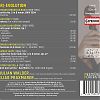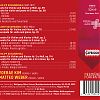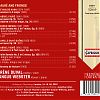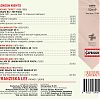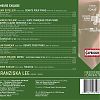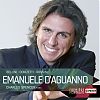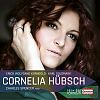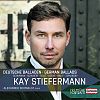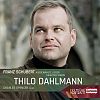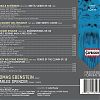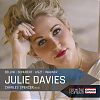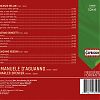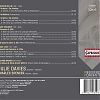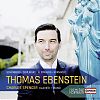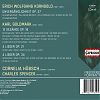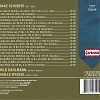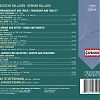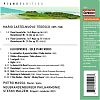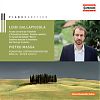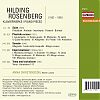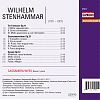editionen
Premiere Portraits

JULIAN WALDER - (R)-EVOLUTION
BACH · PÄRT · GÓRSKI · VITALI · YSAŸE · PIAZZOLLA
JULIAN WALDER, violin · ELIAS PRAXMARER, organ
C3013 [09/2025] PC: 01 UPC: 845221030135
Weitere Bilder

Phillip & Xaver Scharwenka
Violin Sonatas · Suite for violin and piano · Serenade
YOERAE KIM, violin · MATTEO WEBER, piano
C3012 [05/2025] PC: 01 UPC: 845221030128
After a prolonged period during which they were ignored wholesale, the compositions of both Philipp and Xaver Scharwenka are performed again – occasionally, anyway—and some of them have been seen the light of day on record. However, no discographic attempt has yet been made to explore their music in relation to each other, which might seem surprising, given their very similar artistic influences and the close connection between the two composing brothers. In this collection, Yoerae Kim and Matteo Weber demonstrate their sensitivity to a dramaturgically cohesive program, which highlights those intriguing biographical connections. They pair a violin sonata by each brother with a serenade and a suite, spanning a creative period of some 35 years.
Weitere Bilder

Premiere Portraits - IRÈNE DUVAL
REYNALDO HAHN · GABRIEL FAURÉ · GEORGE ENESCU CAMILLE SAINT-SAËNS
IRÈNE DUVAL, violin ANGUS WEBSTER, piano
C3011 PC: 01 UPC: 845221030111
Praised for “her mastery of phrasing and of the dramatic dimension” (Diapason), “astonishing virtuosity” (Revelation Classiques) and “her infinite delicacy” (Le Populaire du centre), French violinist Irène Duval is establishing herself as a uniquely compelling performer with a strong interest in combining works central to the repertoire with little-known gems. Born in France to a French father and Korean mother, Irène Duval grew up in Japan, Indonesia, and Hong Kong before returning to France at the age of eleven. She studied with Suzanne Gessner and Jean-Jacques Kantorow, before entering the Conservatoire National Supérieur de Musique de Paris in 2008 in the class of Roland Daugareil; in 2014 she joined the Kronberg Academy in Germany, where she studied with Mihaela Martin for three years.
Weitere Bilder

Premiere Portraits: Franziska Lee
MICHAEL TIPPETT · BENJAMIN BRITTEN · FRANK BRIDGE · JOHN IRELAND · ARNOLD BAX
Franziska Lee, piano
C3010 PC: 01 UPC: 845221030104
Franziska Lee has made a name for herself as an exceptional pianist capable of eliciting an orchestral palette of colours from the piano. Following her debut CD featuring an exclusively 20th-century French programme (Capriccio C3006), Lee has devoted her second recording to British composers of the same period. Together they tell a story of their time, from Britten’s exuberant Holiday Diary, a joyful interlude between the wars, to Tippett’s escapist Piano Sonata No. 1, written on the eve of the Second World War. With effortless virtuosity and musical insight Lee shines a light on a lesser-known corner of the piano repertoire.
Weitere Bilder

Premiere Portraits: Franziska Lee
Dutilleux · Poulenc · Francaix · Sancan
Franziska Lee, piano
C3006 PC: 01 UPC: 845221030067
Henri Dutilleux (1916 – 2013): Sonate pour piano 1947-1948
»À Geneviève Joy«
Francis Poulenc (1899 – 1963)
Suite française pour piano d’après Claude Gervaise (XVIe siècle) FP 80b 1935 »À Edouard Bourdet«
Francis Poulenc (1899 – 1963): Mélancolie Très modéré FP 105
1940 »À Raymond Destouches«
Jean Françaix (1912 – 1997): Sonate pour piano 1960 »À Idil Biret«
Francis Poulenc (1899 – 1963) Napoli – Suite pour le piano FP 40
1922-1925 »À la mémoire de Juliette Meerovich«
Pierre Sancan (1916 – 2008): Toccata Vif 1943 »À mes chers Parents«
With “Première Portraits” CD-Edition Capriccio set an example for the support of young and talented artists and invite them to release their première CD for a worldwide audience.
Weitere Bilder

Premiere Portraits: Thomas Ebenstein
SCHÖNBERG · ZEMLINSKY · STRAUS · KORNGOLD
Charles Spencer, piano
C3007 PC: 01 UPC: 845221030074
Capriccio’s “Première Portraits” CD-Edition supports young, talented artists by making their debut CDs available to a worldwide audience. This new release presents Thomas Ebenstein, who was born in Carinthia in Austria in 1979 and has been a member of the Vienna State Opera since the 2012/13 season. He has played a number of roles at the Salzburg Festival, including that of Pedrillo (The Abduction from the Seraglio). He has also appeared on a number of DVD performances for Arthaus Musik. These include David (The Mastersingers from Nuremberg), Steersman (The Flying Dutchman), Dancing Master (Ariadne on Naxos), Truffaldino (The Love for Three Oranges) and Alfred (The Bat).
Weitere Bilder

Première Portraits - EMANUELE D’AGUANNO
VINCENZO BELLINI · GAETANO DONIZETTI · GIOACCHINO ROSSINI
EMANUELE D’AGUANNO, tenor · CHARLES SPENCER, piano
C3005 PC: 01 (Special Price) 845221030050
VINCENZO BELLINI (1801 – 1835)
[1] Malinconia, Ninfa gentile · [2] Vanne, o rosa fortunata · [3] Almen se non poss'io · [4] Per pieta, bell'idol mio · [5] Ma rendi pur contento · [6] Torna, vezzosa Fillide · [7] · La ricordanza · [8] Vaga luna, che inargenti
GAETANO DONIZETTI (1797 – 1848)
[9] E morta · [10] Eterno amore e fe · [11] Amore e mort · [12] Il pescatore
[13] Il barcaiolo
GIOACCHINO ROSSINI (1792 – 1868)
La promessa · [15] Il rimprovero · [16] La partenza · [17] L' orgia
With “Première Portraits” CD-Edition Capriccio set an example for the support of young and talented artists and invite them to release their première CD for a worldwide audience.
Emanuele D’Aguanno is one of the most promising young tenors of his generation. He imposes himself at the “Toti dal Monte” Competition in Treviso (Paolino in Cimarosa's Il matrimonio segreto), and immediately started an intense activity which led him to perform quickly in many important houses in Italy and abroad. Among his most important recent engagements: Nemorino in L'elisir d'amore conducted by Bruno Campanella and Die Frau ohne Schatten conducted by Zubin Mehta at Teatro Comunale in Florence, L'elisir d'amore at Bunka Kaikan in Tokyo, Lucrezia Borgia directed by Christoph Loy at the Bayerische Staatsoper in Munich, Salieri's Il mondo alla rovescia at Teatro Filarmonico in Verona, Verdi's Otello (Cassio) at the Canadian Opera in Toronto, Hasse's Piramo e Tisbe with Europa Galante conducted by Fabio Biondi at the Whistun Festival in Salzburg and in Montpellier, Don Giovanni (Don Ottavio) in Glyndebourne, Mayr's Medea in Corinto (Egeo) conducted by Ivor Bolton at the Bayerische Staatsoper in Munich and Il ritorno di Ulisse in patria (Giove and Anfinomo) for his debut at Teatro alla Scala in Milan conducted by Rinaldo Alessandrini.
Weitere Bilder

Premiere Portraits: Julie Davies
BELLINI · SCHUBERT · LISZT · WAGNER
Julie Davies, soprano · Charles Spencer, piano
C3003 PC: 01 845221030036
VINCENZO BELLINI (1801 – 1835)
Sei Ariette / Six Ariettas
No. 2: Vanne, o rosa fortunate (Pietro Metastasio)
La farfalletta (Anonymus)
Sei Ariette / Six Ariettas
No. 5: Per pietà, bell’idol mio (Pietro Metastasio)
No. 6: Ma rendi pur content (Pietro Metastasio)
FRANZ SCHUBERT (1797 – 1828)
4 Canzonas D. 68888
Vedi, quanto adoro D. 510 (Pietro Metastasio)
FRANZ LISZT (1811 – 1886)
3 Sonetti del Petrarca, S. 270a
RICHARD WAGNER (1813-1883)
Les adieux de Marie Stuart WWV 61(Pierre-Jean de Béranger)
With “Première Portraits” CD-Edition Capriccio set an example for the support of young and talented artists and invite them to release their première CD for a worldwide audience.
American soprano Julie Davies has been featured in Darmstadt’s productions of The Tales of Hoffman (all four ladies), I Pagliacci (Nedda), Don Pasquale (Norina), La traviata (Violetta), Desdemona in Otello and Gerhilde in Die Walküre. Ms. Davies is specifically celebrated for her performances of the title roles in Lucia di Lammermoor and La sonnambula. Ms. Davies has won several competitions: Metropolitan Opera Regional Auditions, First in the Naftzger Young Artists Competition, and Finalist in the Marilyn Horne Foundation Competition
Weitere Bilder

Première Portraits -CORNELIA HÜBSCH
ERICH WOLFGANG KORNGOLD · Carl Goldmark
CORNELIA HÜBSCH, soprano · CHARLES SPENCER, piano
C3004 PC: 01 (Special Price) 845221030043
4 Lieder op. 21
4 Lieder op. 34
With “Première Portraits” CD-Edition Capriccio set an example for the support of young and talented artists and invite them to release their première CD for a worldwide audience.
The Austria soprano Cornelia Hübsch was born in Baden near Vienna (Austria) and studied at the University of Music and Performing Arts Graz (Austria) under the supervision of Mrs. Elisabeth Batrice. In addition to that, she attended master courses with Ildiko Raimondi, Kurt Equiluz and David Lutz. She is a regular soloist at various operetta stages and personified different characters in operettas. In 2008 Cornelia Hübsch was rewarded a price at the International Nico Dostal Competition for Operetta. In the fields of opera and operetta concertante she was invited In 2011/2012 to join a concert tournee to the most important concert halls of Spain. Her numerous recitals connects the soprano because of a long-standing
Weitere Bilder

PREMIÈRE PORTRAITS - THILO DAHLMANN
Franz Schubert: Selected Songs
Thilo Dahlmann, baritone · Charles Spencer, piano
C3001 PC: 01 UPC 845221030012
With “Première Portraits” CD-Edition Capriccio set an example for the support of young and talented artists and invite them to release their première CD for a worldwide audience. The bass baritone Thilo Dahlmann won the first prize at the North Rhine-Westphalia State Competition and was a member of the International Opera Studio of the Zurich Opera House, where he performed many roles. The young bass baritone has guested at the German Opera of the Rhine in Duesseldorf, Wuppertal Buehnen, Koblenz Theater and St. Gallen Theater. He has sung important bass baritone roles in Germany and abroad under conductors such as Helmuth Rilling, Franz-Welser-Moest, Philippe Jordan, Helmut Müller Brühl, Andreas und Christoph Spering, Masaaki Suzuki und Ralf Otto.
Weitere Bilder

PREMIÈRE PORTRAITS - KAY STIEFERMANN
GERMAN BALLADS: Schumann · Schubert · Loewe · Wolf · Zemlinsky
Kay Stiefermann, Baritone · Alexander Schmalcz, piano
C3002 PC: 01 UPC 845221030029
With “Première Portraits” CD-Edition Capriccio set an example for the support of young and talented artists and invite them to release their première CD for a worldwide audience.
Kay Stiefermann completed his studies with distinction in the class of Kammersänger Kurt Moll at the Academy of Music in Cologne. Since his first commitment in the ensemble of the Hamburg State Opera from 1997 to 2001, where his roles included Papageno (Die Zauberflöte), Schaunard (La Bohème) and Danilo (The Merry Widow), he has sung many great roles of the baritone repertoire. In recent years, he has increasingly sung roles from the German field, such as Amfortas (Parsifal), Kurwenal (Tristan and Isolde), the Dutchman (The Flying Dutchman), Simone (Eine Florentinische Tragödie), Gyges (King Candaules), Mandryka (Arabella) and Don Pizarro (Fidelio). He has been a guest at the State Opera in Berlin, the Comic Opera in Berlin, the State Theatre in Hanover, the German Opera on the Rhine, the State Theatre in Darmstadt, the Ruhr Triennale, the Lincoln Centre Festival in New York, the Teatro Municipal in Rio de Janeiro, the Teatro Massimo in Palermo, the Teatro Regio in Turin, the Volksoper in Vienna, the Opera in Graz, the Opéra national du Rhin, the De Nederlandse Opera in Amsterdam or the Bayreuth Festival.
Weitere Bilder
Piano Rarities

piano rarities - MARIO CASTELNUOVO-TEDESCO: Piano Concertos Nos.1 & 2
Solo Piano Works
Pietro Massa, piano Neubrandenburger Philharmonie · Stefan Malzew
2CD-Set C5156 PC: 21 (Special Price) UPC: 845221051567
Mario Castelnuovo-Tedesco (Florence 1895 – Beverly Hills 1968) was a composer and humanist. His life was characterized by a lasting tendency to discover himself as a component of ancient cultural traditions, first the Tuscan and then the Jewish one. On the other hand, he showed an inclination to withdraw from the historical present, on the one hand, due to his reserved disposition and, on the other, because of the tragic events that rocked his existence.
In 1939, he took his leave of his country and emigrated to the USA to safeguard the future of his own family and above all protect the lives of his two children. Arturo Toscanini and Jascha Heifetz, who had already performed his music several times, supported him in this difficult period and made a substantial contribution to him obtaining a position as the composer of film music with Metro Goldwyn Mayer.
The Piano Concertos in G major No. 1 op. 46 and in F major No. 2 op. 92 were written in 1927 and 1936/37 respectively; the latter presumably while preparing for exile.
Weitere Bilder

HILDING ROSENBERG (1892-1985)
Piano Rarities: Suite (1924); Plastiska scener (1921); Sonatin (1949); Tema med variationer (1941)
ANNA CHRISTENSSON, Klavier / piano
C5116 PC: 21 UPC: 845221051161
Until the middle of the 20th century most Swedish composers refused to accept new tendencies coming from Paris, Vienna or Berlin. However, also advocates of an avant-garde tonal language existed. Of all people, the 1892 born son of a poor couple looking after the herbary of a convent of nuns in the rural idyll of Bosjökloster, should emerge as the key player of Swedish Modernity: Hilding Rosenberg. He considered himself as pioneer, even as a guiding light for others. And indeed, the composer’s merits are out of all proportion to his quite low name recognition nowadays.
The performance of Schönberg’s chamber symphony op. 9 in Dresden was a sort of arousal for him. He himself later described it as a “distressing experience, which seemed to turn the common understanding how to compose music upside down.” From this impulse his first string quartet was born, a piece which is said to have introduced atonality to Sweden.
Hilding Rosenberg became one of the most important personalities of Swedish musical life of the 20th century. Besides composing his own music, he made contemporary music as well as old masters available to the public as a conductor – he had studied with Hermann Scherchen among others. From 1932 until 1934 he even managed the Royal Swedish Opera in Stockholm. His personal contacts were far-reaching. Among the dramatists working with him were Bertold Brecht and the elderly Thomas Mann, whom Rosenberg visited in the USA. Numerous official awards and distinctions mark the meritorious career of a man, who on paper is considered the “father of Swedish modernity”, but whose fame as composer is still somewhat secret.
Weitere Bilder

WILHELM STENHAMMAR (1871-1927)
Piano Rarities: Tre Fantasier op.11; Sensommarnätter op.33; Sonate op.12
CASSANDRA WYSS, Klavier / piano
C5117 PC: 21 UPC: 845221051178
Quite a few foreign visitors of the Stockholm Konserthuset probably ask themselves whom the bust, which is placed directly next to the entrance of the royal box, depicts. It is a portrayal of Wilhelm Stenhammar, whose prominent placing absolutely reflects the central role which Stenhammar played in the musical history of Sweden, even if outside of Scandinavia he is far less well known than his colleagues and friends Carl Nielsen and Jean Sibelius.
Already at the age of 23 Stenhammar cut a dash as pianist and composer: The premiere of his first piano concert in Stockholm in 1894 was such a great success that Richard Strauss put the piece on stage with the Berlin Philharmonics and Stenhammar as soloist shortly afterwards. The pieces dating from the 1890s mirror the adoption of European music tradition, whereas since 1900 a more reflexive element can be observed. From 1909 onwards, Stenhammar eventually focused on an intensive study of the counterpoint, which should lead the way out of the compositional crisis, which had affected the whole of Europe and had caused Arnold Schönberg in Vienna to abandon the major-minor tonality.
Weitere Bilder

FREDERIC MOMPOU
Piano Rarities: Preludes, Canciónes y danzas, Impresiones intimas
OLENA KUSHPLER, Klavier / piano
C5115 PC: 21 UPC: 845221051154
“To achieve a maximum level of expressiveness with a minimum of means“ was the defined goal of the pianist and composer Frederic Mompou y Dencausse, who was born in Barcelona in 1893.
ENRIQUE GRANADOS was convinced of young Mompou’s talent and wrote a letter of recommendation to the conservatoire in Paris. In Paris, the focal point of the musical avant-garde in 1900, Mompou, who was characterized by timidity and neurasthenic upsets, at first did not manage to successfully deliver his letter of recommendation. Instead – and this must be considered a stroke of luck – he met Ferdinand Motte-Lacroix, who did not only become a splendid piano teacher for him but also a close friend and later an interpreter of his compositions.
Motte-Lacroix was exited by his student’s talent and introduced him to the artistic circles of the city, in which at that time the outstanding Maurice Ravel and the compositions of the Groupe des Six caused sensations. This was an environment in which the timid Mompou would have been completely lost without the help of his friend and supporter. A concert on 15th of April 1921, in which Ferdinand Motte-Lacroix presented the works of his student to the public, became a rousing success for Mompou and was his breakthrough. For the next 20 years he lived as a celebrity in the French metropolis, interrupted only by short breaks.
Weitere Bilder

EDITION: piano rarities
LUIGI DALLAPICCOLA (1904-1975)
Piccolo concerto per pianoforte e orchestra da camera
Due pezzi per orchestra – Sonatina canonica
Tre episodi dal balletto “Marsia” – Quaderno musicale di Annalibera
1 CD PC: 21 C5045 – UPC 84522105045 4
PIETRO MASSA, Klavier / piano
RUNDFUNK-SINFONIEORCHESTER BERLIN
PETER HIRSCH, Dirigent / conductor
Die vorliegenden fünf Klavierwerke von Luigi Dallapiccola fallen alle in die Schaffensperiode von 1935 bis 1952, in der die musikalische Sprache des Komponisten ihre entscheidende Ausprägung erfuhr. Die Komposition neuen Stils, in der sich schon erste chromatische Passagen finden, wird durch überschichtete Akkorde angereichert bis sie sich zur gesamten Chromatik entfaltet. In ihrem sehr differenzierten Charakter und Stil markieren die Kompositionen für Klavier wichtige Phasen auf dem Weg der fortschreitenden Annäherung an die Zwölftontechnik bis zu ihrer völligen Übernahme.
Pietro Massa ist zwar in Mailand geboren, aber seit 1999 stellt Berlin das Zentrum seines Lebens sowie den Mittelpunkt einer internationalen Karriere als Solist dar. Sein Repertoire für Klavier und Orchester umfasst zwischenzeitlich an die 20 Klavierkonzerte, die bereits aufgeführt worden sind oder im Programm mit vielen Orchestern weltweit stehen.

EGON WELLESZ (1885-1974)
Piano Concerto op. 49 / Violin Concerto op. 84
MARGARETE BABINSKY, Klavier / piano
DAVID FRÜHWIRTH, Violine / violin
RUNDFUNK SINFONIE-ORCHESTER BERLIN
ROGER EPPLE, Dirigent / conductor
1 CD PC: 21 C5027 – UPC 84522105027 0
Am 21. Oktober 1885 wurde Egon Wellesz in Wien als einziges Kind einer aus dem ungarischen Teil der Donaumonarchie zugezogenen wohlhabenden Kaufmannsfamilie geboren. Nach der Reifeprüfung und einem kurzem Intermezzo als Hörer an der juridischen Fakultät der Universität Wien wechselte er zur Musikwissenschaft (sein verehrter Lehrer war bekanntlich Guido Adler) und wurde daneben einer der ersten Privatschüler Arnold Schönbergs. Obwohl er sich dessen strengem Unterricht schon nach zwei Jahren entzog und eigene Wege ging – was ihm Schönberg nie wirklich verzieh –, stellten sich schon bald erste Erfolge ein. Vor 1938 zählte Wellesz sogar zu den wichtigsten zeitgenössischen Komponisten überhaupt: Interpreten von Rang nahmen sich seiner Werke an und seine zahlreichen Arbeiten für das Musik- und Tanztheater, die teilweise auf Libretti der Freunde Jakob Wassermann und Hugo von Hofmannsthal geschrieben wurden, standen permanent auf den Spielplänen der wichtigsten deutschsprachigen Bühnen. Aber auch als Musikwissenschaftler leistete er etwa mit der erstmaligen Entzifferung der byzantinischen Notenschrift, mit seinen Arbeiten über die Barockoper oder mit der überhaupt ersten Schönberg-Biographie Hervorragendes.
Von 1918 bis 1937 verbrachte Egon Wellesz zusammen mit seiner Familie alle Sommer in Alt-Aussee in der Steiermark, er nütze diese Zeit der Ruhe vornehmlich zum Komponieren, wozu er während des anstrengenden Arbeitsjahres an der Universität nur selten kam. So wurde auch das Konzert für Klavier und Orchester, op. 49 dort zu Beginn des Sommers 1933 in Angriff genommen und bereits am 20. Juli desselben Jahres beendet. Es zeigt des Komponisten damalige intensive Beschäftigung mit neobarocken und neoklassizistischen Kompositionstechniken, immer allerdings durch die Brille eines dem Schönberg-Kreis in gewisser Hinsicht nahe stehenden Komponisten gesehen.
Die Ereignisse des 12. März 1938 beendeten diese so erfolgreiche Karriere jedoch abrupt. Sie hatten für Wellesz empfindliche Konsequenzen: Als Jude, Monarchist und Verfasser von “entarteter Musik” wurde der 53jährige, der sich glücklicherweise in diesen Tagen zufällig in Holland bei Aufführungen seines Erfolgsstücks “Prosperos Beschwörungen” aufhielt und wohlweislich nicht mehr zurückkehrte, sofort nach der “Machtübernahme” aller seiner Ämter enthoben und polizeilich gesucht.
Das bemerkenswerte Violinkonzert, op. 84, aus dem Jahre 1961 unterscheidet sich nicht nur in seiner Tonsprache signifikant vom nicht ganz dreißig Jahre zuvor entstandenen Klavierkonzert. Zwischen 19. März und 30. April 1961 komponiert, zog sich die Instrumentation dann doch bis zum 10. Juli dieses Jahres hin. Das Werk wurde durch den Wiener Geiger Eduard Melkus beauftragt und am 12. Jänner 1962 in Wien mit Melkus als Solisten und dem “Großen Orchester des Österreichischen Rundfunks” uraufgeführt.


